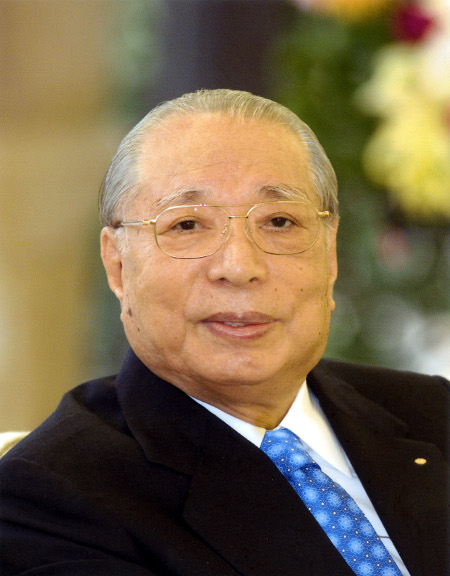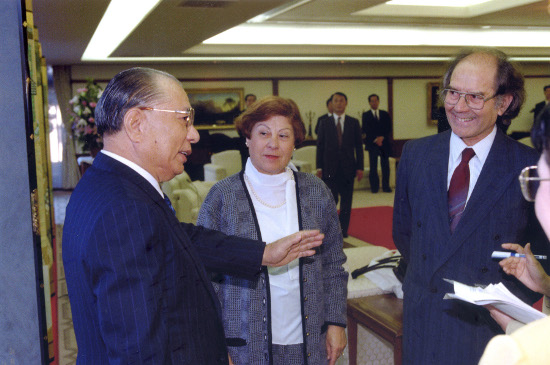Thoughts on the upcoming NPT Review Conference: Daisaku Ikeda
Mar. 16, 2010
Toward a nuclear abolition summit in Hiroshima in 2015
by Daisaku Ikeda
It was the revered Chinese author Ba Jin (1904-2005) who declared that Hiroshima was the city where the victory of peaceful and constructive energies can be witnessed.
As humanity rises to confront the challenges that face us, Hiroshima is a wellspring of courage. I have heard that in places overseas hit by earthquakes and other natural disasters, people are encouraged by the simple fact that the relief aid they are receiving has come from Hiroshima. The power of hope, the capacity to make the impossible possible, resonates in the word "Hiroshima."
In January 1975, 30 years after the atomic bombings of Hiroshima and Nagasaki, I visited the United Nations Headquarters in New York to submit to the Secretary-General 10 million signatures calling for nuclear abolition. These had been collected through the earnest efforts of the Soka Gakkai Youth Division in Japan.
Several days later I visited the University of Chicago. There I was shown a monument commemorating the first controlled nuclear chain reaction in a nuclear pile. The success of this experiment brought the development of nuclear weapons significantly closer to reality. The sight of this monument is etched indelibly in my memory.
Scientists involved in that work at the University of Chicago were among those who petitioned against the use of the atomic bomb even as the final preparations were underway toward its completion. Nuclear weapons arrived in this world amidst grave concerns and misgivings on the part of many of the scientists involved in their development.
This experience deepened my resolve to help generate an ever more robust solidarity of ordinary citizens determined that nuclear weapons must never be used again.
U.S. President Barack Obama, who once taught at the University of Chicago Law School, first expressed his determination to work for a world without nuclear weapons in October 2007, several months after he announced he was running for president.
Mr. Obama was scheduled to speak at the campus of DePaul University, also in Chicago. In an episode that was chronicled by the Chugoku Shimbun, on the way to the venue, he passed through a hallway where photographs of Hiroshima after the atomic bombing were on display as part of an exhibition organized by the Hiroshima Peace Culture Foundation. It was after seeing this display that he made his first call for a world without nuclear weapons.
Obama had doubtless been planning to discuss nuclear weapons that day. But in my eyes, this incident dramatically symbolizes how the A-bomb survivors’ unrelenting condemnation of the inhumane nature of nuclear weapons has effected a significant change in the deeper currents of history.
The atomic bombings of Hiroshima and Nagasaki are counted among the most shocking events of the 20th century. And yet very few people have a clear awareness of what actually happened there.
Dr. Adolfo Pérez Esquivel, the great champion of human rights from Argentina, described to me the intense impact of his visits to Hiroshima Peace Memorial Museum: “I thought I understood the horrors of the atomic bombings, but what I learned was of a tragedy that far outstripped the bounds of imagination.”
When the Preparatory Committee for the 2010 Nuclear Non-Proliferation Treaty (NPT) Review Conference was held in New York last May, atomic bomb survivors who traveled from Japan to participate visited the Soka Gakkai International Culture Center there and shared their experiences. All who attended were deeply moved by the heartfelt determination expressed by the hibakusha that their suffering should never again be experienced by anyone, anywhere in the world.
The Hiroshima-Nagasaki Declaration of Nobel Peace Laureates, released around the same time by Dr. Esquivel and other individuals of conscience, astutely noted that "the fact that humanity has managed to avoid a third nuclear nightmare is not merely a fortunate whim of history. The resolve of the A-bomb survivors, who have called on the world to avert another Hiroshima or Nagasaki, has surely helped prevent that catastrophe."
The DVD "Testimonies of Hiroshima and Nagasaki" produced by the SGI includes the following poignant statement from one of the women interviewed: "The nuclear devastation I experienced firsthand and the folly of human beings killing each other must never be repeated. Never again. I realized it was my mission to convey this message to the world. I think that is why I have survived until now."
It is still widely assumed that abolition of nuclear weapons is a long way off. Even President Obama has questioned whether it can be realized during his lifetime. But I firmly believe that one potent breakthrough would be to create a clear international norm establishing the illegality of their use. Although this would not be easy, it would both contribute to preventing further nuclear proliferation and constitute a significant advance toward nuclear abolition.
There is a steadily deepening awareness, even among the leaders of the states that possess them, that nuclear weapons are essentially unusable as a means of achieving military objectives. Their only possible purpose is deterrence. And the justifications for deterrence and thus possession will be undermined by establishing the illegality of the use of nuclear weapons as the common norm of humankind.
So here I would like to urge that the NPT Review Conference to be held at the UN Headquarters in May initiate work toward establishing the illegality of the use of nuclear weapons, and that this be legally codified within five years. Such efforts should culminate in a nuclear abolition summit in 2015--to be held in Hiroshima and Nagasaki 70 years after the nuclear bombings of these two cities.
"I want to see nuclear abolition achieved in my lifetime. I have stayed alive until now to see it for myself." This is the earnest call of an 85-year-old hibakusha interviewed last year. I believe that representatives of A-bomb survivors should be given the opportunity to address the NPT Review Conference before it begins its deliberations, conveying their experiences, hopes and goals to the world.
The title of the Chugoku Shimbun's peace feature--"Nuclear weapons can be eliminated"--is a crystallization of the courageous vow of Hiroshima. With the average age of the A-bomb survivors now exceeding 75, their spirit is being passed on to younger generations. Peace Seeds is a newspaper produced by teenagers in Hiroshima, which I have greatly enjoyed reading myself. I know many young people from Hiroshima, and am keenly aware of how they are striving toward a nuclear-free world with all the power and passion of youth.
One example of this youthful initiative is the story I heard of the collaboration between a young Japanese video artist and photographer whose father is an A-bomb survivor and an American painter, the daughter of a physicist who worked on the Manhattan Project. Their artworks calling for peace have been exhibited at the UN Headquarters in New York and elsewhere.
If present realities stand in the way of nuclear abolition, then the people of the world must come together to create a new reality, opening a path toward that goal.
The Convention on Cluster Munitions was made possible through the initiative of ordinary citizens; last month it cleared the final hurdle allowing it to enter into force on August 1. In similar fashion, we should build global grassroots solidarity toward the adoption of a Nuclear Weapons Convention that would comprehensively ban these weapons.
The dropping of the atomic bomb on Hiroshima changed world history. I firmly believe that by triumphing over that tragedy, the spirit of Hiroshima has brought about a new spring of peace and hope for humanity.
Profile
Daisaku Ikeda
Daisaku Ikeda was born in Tokyo in 1928. He has traveled to 54 countries and territories around the globe to meet and exchange views with representatives of political, cultural and academic fields. His published dialogues include Choose Life, a dialogue with British historian Arnold J. Toynbee. He has been a recipient of numerous awards including the United Nations Peace Award.
(Originally published on March 16, 2010)









